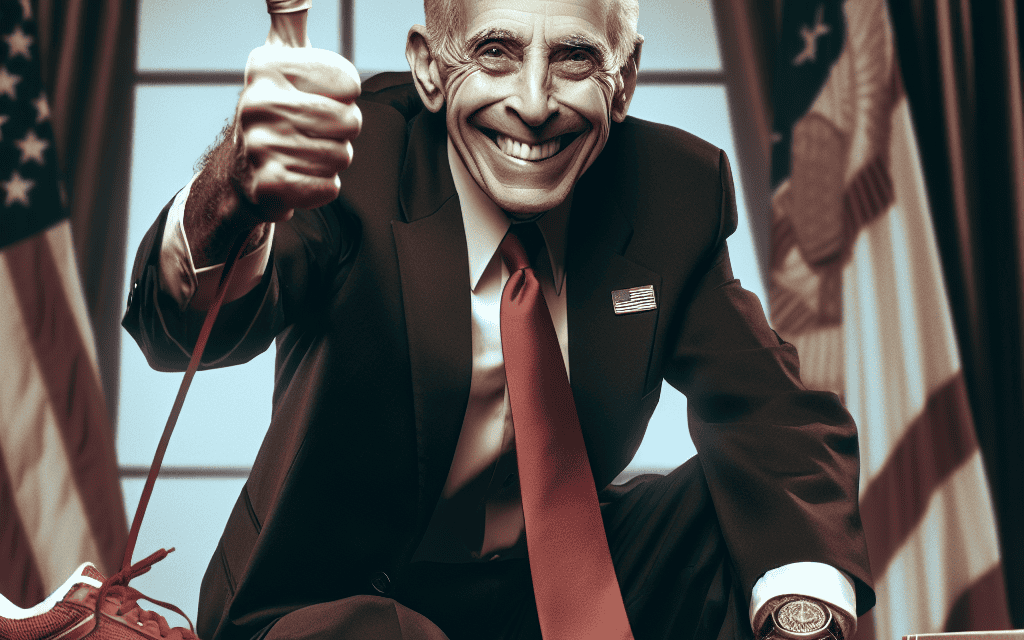RFK Jr. Surpasses Major Milestone in Bid for HHS Secretary
Robert F. Kennedy Jr. (RFK Jr.), a prominent environmental attorney and vaccine skeptic, has recently made headlines by surpassing a significant milestone in his campaign for the position of Secretary of Health and Human Services (HHS). His bid has sparked considerable debate and interest across the political spectrum, raising questions about public health policy, vaccine mandates, and the future of health governance in the United States. This article delves into the implications of RFK Jr.’s candidacy, exploring his background, the political landscape, public health concerns, and the potential impact of his policies on American health systems.
1. Background of RFK Jr.: A Legacy of Activism
Robert F. Kennedy Jr. is not just a name; he is a legacy. Born into the illustrious Kennedy family, RFK Jr. has carved out a unique path as an environmental activist and attorney. His work has primarily focused on environmental issues, particularly those related to pollution and public health.
RFK Jr. graduated from Harvard College and earned his law degree from the University of Virginia. He has been a prominent figure in the fight against pollution, serving as the president of the Waterkeeper Alliance, an organization dedicated to protecting water resources. His advocacy has led to significant legal victories against major corporations accused of environmental degradation.
However, his stance on vaccines has drawn considerable controversy. RFK Jr. has been a vocal critic of vaccine safety, claiming that vaccines are linked to various health issues, including autism. This position has garnered him a substantial following among vaccine skeptics but has also led to significant backlash from public health officials and the scientific community.
As he campaigns for the HHS Secretary position, RFK Jr.’s background in environmental law and his controversial views on vaccines are central to his platform. His supporters argue that his experience in environmental health makes him a suitable candidate for overseeing public health policies, while critics fear that his anti-vaccine stance could undermine decades of public health progress.
2. The Political Landscape: RFK Jr.’s Positioning
The political landscape surrounding RFK Jr.’s candidacy is complex and multifaceted. As a member of the Democratic Party, he faces the challenge of appealing to a base that is largely pro-vaccine and supportive of established public health measures. However, his unique positioning as a candidate who challenges the status quo has garnered him attention from various voter demographics.
RFK Jr. has positioned himself as a populist candidate, advocating for transparency in government and questioning the influence of pharmaceutical companies on public health policy. His campaign has resonated with individuals who feel disillusioned by traditional political structures and are seeking an alternative voice.
Key factors influencing the political landscape include:
- Public Health Policy: The ongoing debates surrounding vaccine mandates and public health measures have polarized opinions. RFK Jr.’s anti-vaccine stance places him at odds with many public health officials, yet it appeals to a segment of the population that values personal choice and skepticism towards government mandates.
- Environmental Issues: RFK Jr.’s background in environmental law positions him as a candidate who understands the intersection of health and environmental policy. His advocacy for clean water and air resonates with voters concerned about climate change and its impact on public health.
- Media Coverage: The media’s portrayal of RFK Jr. has been mixed, with some outlets highlighting his environmental achievements while others focus on his controversial views on vaccines. This dichotomy influences public perception and voter sentiment.
- Grassroots Support: RFK Jr. has cultivated a grassroots movement that emphasizes community engagement and activism. His supporters often mobilize through social media platforms, creating a strong online presence that amplifies his message.
- Opposition from Established Politicians: Established politicians within the Democratic Party may view RFK Jr. as a threat to their agenda, leading to potential pushback and challenges in securing endorsements and support.
As RFK Jr. continues his campaign, navigating this complex political landscape will be crucial for his success. His ability to balance his controversial views with the expectations of the Democratic Party will determine his viability as a candidate for HHS Secretary.
3. Public Health Concerns: The Vaccine Debate
The vaccine debate is perhaps the most contentious aspect of RFK Jr.’s candidacy. His vocal opposition to vaccines has raised alarms among public health officials, who argue that his views could undermine vaccination efforts and public trust in health authorities.
Vaccines have been a cornerstone of public health for decades, significantly reducing the incidence of infectious diseases such as measles, polio, and influenza. The Centers for Disease Control and Prevention (CDC) reports that vaccines prevent an estimated 2-3 million deaths each year worldwide. However, the rise of vaccine skepticism, fueled in part by misinformation and high-profile figures like RFK Jr., poses a significant challenge to these achievements.
Key public health concerns related to RFK Jr.’s stance include:
- Impact on Vaccination Rates: Studies have shown that vaccine hesitancy can lead to decreased vaccination rates, resulting in outbreaks of preventable diseases. For instance, the CDC reported a resurgence of measles in the United States, attributed to declining vaccination rates among certain populations.
- Public Trust in Health Authorities: RFK Jr.’s criticisms of vaccines and pharmaceutical companies can erode public trust in health authorities. When individuals question the safety and efficacy of vaccines, it can lead to broader skepticism about public health recommendations.
- Legislative Implications: If RFK Jr. were to become HHS Secretary, his policies could influence vaccine legislation and funding for vaccination programs. This could have far-reaching consequences for public health initiatives aimed at increasing vaccination coverage.
- Scientific Consensus: The overwhelming consensus among scientists and public health experts is that vaccines are safe and effective. RFK Jr.’s views contradict this consensus, raising concerns about the potential for misinformation to shape health policy.
- Community Health Outcomes: Vaccine-preventable diseases disproportionately affect vulnerable populations. A decline in vaccination rates can lead to increased morbidity and mortality, particularly among children and immunocompromised individuals.
As the vaccine debate continues to evolve, RFK Jr.’s candidacy raises critical questions about the future of public health policy in the United States. His ability to address these concerns while maintaining support from his base will be a significant challenge.
4. The Role of HHS: Responsibilities and Challenges
The Department of Health and Human Services (HHS) plays a crucial role in shaping health policy and overseeing public health initiatives in the United States. As the largest government agency focused on health, HHS is responsible for a wide range of functions, including disease prevention, health promotion, and healthcare access.
If RFK Jr. were to be appointed as HHS Secretary, he would face several responsibilities and challenges:
- Public Health Promotion: HHS is tasked with promoting public health through initiatives aimed at preventing disease and improving health outcomes. RFK Jr. would need to balance his views on vaccines with the agency’s mission to promote vaccination and disease prevention.
- Healthcare Access: Ensuring access to healthcare services is a critical responsibility of HHS. RFK Jr. would need to address disparities in healthcare access, particularly among marginalized communities, while advocating for policies that align with his views.
- Regulatory Oversight: HHS oversees various regulatory agencies, including the Food and Drug Administration (FDA) and the Centers for Disease Control and Prevention (CDC). RFK Jr.’s approach to regulation could significantly impact how these agencies operate and enforce health policies.
- Funding Allocation: HHS manages substantial funding for public health programs. RFK Jr. would need to prioritize funding for initiatives that align with his agenda while addressing the needs of existing programs that focus on vaccination and disease prevention.
- Collaboration with State and Local Health Departments: HHS works closely with state and local health departments to implement public health initiatives. RFK Jr. would need to foster collaboration and communication to ensure effective implementation of health policies at all levels.
The role of HHS Secretary is pivotal in shaping the future of public health in the United States. RFK Jr.’s unique perspective and controversial views could lead to significant changes in how the agency operates, but they also pose challenges that could impact public health outcomes.
5. The Future of Health Policy: Implications of RFK Jr.’s Candidacy
The implications of RFK Jr.’s candidacy for HHS Secretary extend beyond his views on vaccines. His approach to health policy could reshape the landscape of public health in the United States, influencing everything from environmental health to healthcare access.
Key implications of RFK Jr.’s candidacy include:
- Environmental Health Policies: Given RFK Jr.’s background in environmental law, he may prioritize policies that address the intersection of environmental issues and public health. This could lead to increased focus on air and water quality, climate change, and their impact on health outcomes.
- Healthcare Reform: RFK Jr. may advocate for reforms aimed at increasing healthcare access and affordability. His populist approach could resonate with voters seeking change in the healthcare system, potentially leading to new initiatives aimed at expanding coverage.
- Public Engagement: RFK Jr.’s grassroots approach to campaigning may influence how HHS engages with the public. Increased transparency and community involvement could become hallmarks of his tenure, fostering a more participatory approach to health policy.
- Challenges to Established Norms: RFK Jr.’s candidacy challenges established norms within the Democratic Party and public health community. His willingness to question conventional wisdom may lead to new discussions about vaccine policy, health governance, and the role of government in public health.
- Potential for Polarization: RFK Jr.’s controversial views could further polarize public opinion on health issues. This polarization may complicate efforts to build consensus around public health initiatives, making it challenging to implement effective policies.
As RFK Jr. continues his campaign for HHS Secretary, the implications of his candidacy will be closely monitored by public health officials, policymakers, and the general public. His unique perspective and approach to health policy could shape the future of public health in the United States for years to come.
Conclusion
RFK Jr.’s bid for the position of HHS Secretary marks a significant moment in American politics and public health. His background as an environmental activist, coupled with his controversial views on vaccines, positions him as a polarizing figure in the ongoing debates surrounding health policy.
The political landscape surrounding his candidacy is complex, with challenges and opportunities that could shape the future of public health in the United States. As he navigates the intricacies of public health concerns, the role of HHS, and the implications of his policies, RFK Jr. will need to balance his unique perspective with the expectations of the Democratic Party and the broader public.
Ultimately, RFK Jr.’s candidacy raises critical questions about the future of health governance, the role of vaccines in public health, and the intersection of environmental issues and health policy. As the nation grapples with these challenges, RFK Jr.’s journey toward HHS Secretary will undoubtedly be a focal point of discussion and debate in the coming months.





